#UPSCMains
Text
https://thestudyias.net/
The Study. An Institute For IAS. You Deserve The Best. No. 1 Institute for History under the guidance of Manikant Singh in Civil Service Examination
#world history#modern history#ancient history#Mediaval history#upscpreparation#upsc interview#upscmains#current affairs for upsc#ManikantSingh#UPPCS#app-in-playstore
2 notes
·
View notes
Text
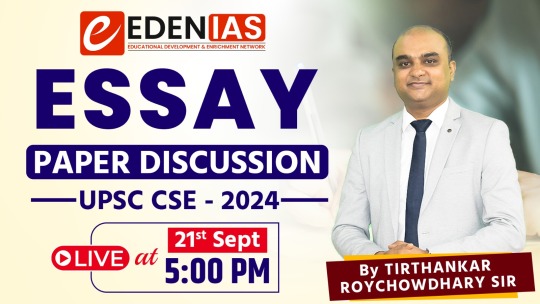
🔴 Live UPSC Mains 2024 Essay Paper Discussion & Analysis | EDEN IAS with Tirthankar Roychowdhary Sir
Join us for an insightful live discussion on the UPSC Essay Paper 2024, held on 20th Sep, where we’ll have an in-depth discussion into the approach of questions in the given essay paper which will help other aspirants also to develop the art of essay answer writing for the Civil Services Examination as well as it will provide an idea of approach to be followed by the mains aspirants as well to judge their probable score.
#iascoaching#upsccoaching#civilservices#upsc#ias#upscmains#civilserviceexam#upsccse#dkt#ias2024#essay2024#essaywriting#upscmains2024#upsc2024#paperdiscussion#analysis#live#youtubelivestream
0 notes
Text
Crafting Your Path to UPSC Success: A Strategic Guide for Aspiring Civil Servants
The Union Public Service Commission (UPSC) Civil Services Examination stands as a formidable challenge, attracting thousands of aspirants each year with its promise of a prestigious career in public service. The journey from preparation to success requires a blend of strategic planning, resourcefulness, and resilience. This article offers a strategic guide to navigating the UPSC preparation process, focusing on effective strategies, resource management, and key tips for excelling in this rigorous examination.
1. Understanding the UPSC Examination Structure
The UPSC Civil Services Examination is divided into three distinct stages, each assessing different skills and knowledge areas:
Preliminary Examination: The initial screening phase, comprising two objective-type papers – General Studies (GS) Paper I and Civil Services Aptitude Test (CSAT) Paper II.
Mains Examination: A detailed written test with nine papers, including Essay writing, General Studies, and Optional subjects.
Interview (Personality Test): A final assessment focusing on the candidate’s personality, suitability for civil services, and overall demeanor.
2. Breaking Down the Syllabus
The UPSC syllabus is extensive and can be overwhelming. However, a systematic approach can simplify the process:
Preliminary Exam Syllabus:
General Studies Paper I: Focuses on Indian History, Geography, Current Events, Indian Polity, Economic and Social Development, Environmental Ecology, and General Science.
CSAT Paper II: Tests comprehension, logical reasoning, analytical ability, decision-making, and basic numeracy.
Mains Exam Syllabus:
Essay Paper: Requires candidates to write two essays on different topics, demonstrating analytical and expressive skills.
General Studies Papers I-IV:
GS I: Indian Heritage, Culture, History, and Geography.
GS II: Governance, Constitution, Polity, Social Justice, and International Relations.
GS III: Technology, Economic Development, Bio-diversity, Environment, Security, and Disaster Management.
GS IV: Ethics, Integrity, and Aptitude.
Optional Subject Papers: Choose one subject from a list of options based on personal interest or academic background.
3. Essential Resources for UPSC Preparation
Selecting the right resources is crucial for effective preparation. Here’s a guide to essential materials:
Books:
General Studies: "Indian Polity" by M. Laxmikanth, "A Brief History of Modern India" by Rajiv Ahir, "Indian Economy" by Ramesh Singh, and "Environment and Ecology" by Majid Husain.
Current Affairs: Daily newspapers like "The Hindu" or "The Indian Express", and monthly magazines such as "Yojana" and "Kurukshetra".
Online Platforms:
Use UPSC-specific websites and apps for current affairs updates, study materials, and practice tests.
Engage with online forums and discussion groups to exchange knowledge and insights with other aspirants.
Previous Years’ Papers and Mock Tests:
Analyze past question papers to understand the exam pattern and question types.
Regularly attempt mock tests to improve time management, answer writing skills, and identify areas needing improvement.
4. Developing a Structured Study Plan
A well-organized study plan is key to managing the extensive syllabus and achieving exam readiness:
Initial Preparation:
Understand the Syllabus: Break down the syllabus into manageable sections and create a study timetable.
Resource Collection: Gather all necessary books, materials, and subscriptions.
Ongoing Study:
Daily Routine: Dedicate specific hours each day to studying different subjects. Include time for reading, note-taking, and revising.
Weekly Goals: Set and review weekly targets to track progress and adjust plans as necessary.
Prelims Preparation:
Focus on mastering key concepts and practicing multiple-choice questions. Emphasize current affairs and general knowledge.
Mains Preparation:
Practice writing comprehensive answers and essays. Deepen your understanding of core topics and integrate knowledge across subjects.
Interview Preparation:
Develop communication skills, stay updated on current affairs, and engage in mock interviews to build confidence and polish presentation skills.
5. Managing Stress and Maintaining Balance
The rigorous nature of UPSC preparation can lead to stress and burnout. Maintaining balance and managing stress is crucial:
Regular Breaks: Incorporate short breaks into your study routine to prevent fatigue and maintain productivity.
Physical Health: Engage in regular physical activities and maintain a balanced diet to stay energized and focused.
Mental Well-being: Practice stress-relief techniques such as meditation or yoga, and ensure you have leisure activities to relax.
6. Final Tips for Effective Preparation
Consistency and Discipline: Stick to your study plan with dedication and consistency. Regular study sessions and disciplined time management are essential.
Flexibility: Be prepared to adjust your strategies based on your progress and evolving needs.
Self-Assessment: Continuously evaluate your performance through mock tests and practice papers. Address weak areas and refine your strategies.
Conclusion
Successfully navigating UPSC preparation requires a blend of strategic planning, diligent study, and self-care. By understanding the examination structure, leveraging essential resources, and following a structured study plan, candidates can effectively tackle the challenges of the UPSC Civil Services Examination. Remember, perseverance, adaptability, and a positive mindset are key to turning the demanding journey into a rewarding experience. With the right approach and unwavering determination, success in the UPSC examination is within reach.
0 notes
Text
Upsc Mains Simulation tests 2024
🔥One to one LIVE evaluation after test within 3 days with senior faculty
🔥UPSC standard question papers
🔥To the point model answers
🔥Same environment like final upsc test centre will be maintained
🔥Test timings will be same as upsc timings
Contact Mahesh 8977820258
Fill the form for queries
https://docs.google.com/forms/d/e/1FAIpQLSfLsRgnyvzcCwlm62X4Eqf0toyarjpB5MiWe0i8mfjAT2hx0g/viewform
0 notes
Text
Daily Routine for UPSC Preperation | Timetable | UPSC | BY GAURAV SIR
youtube
Are you an UPSC aspirant struggling to create a daily routine that works for you? Look no further! Gaurav Sir, a renowned UPSC coach, shares his proven daily routine that has helped countless students crack the exam. This routine is designed to help you stay focused, motivated, and on track to achieve your dream of becoming an IAS officer
0 notes
Text
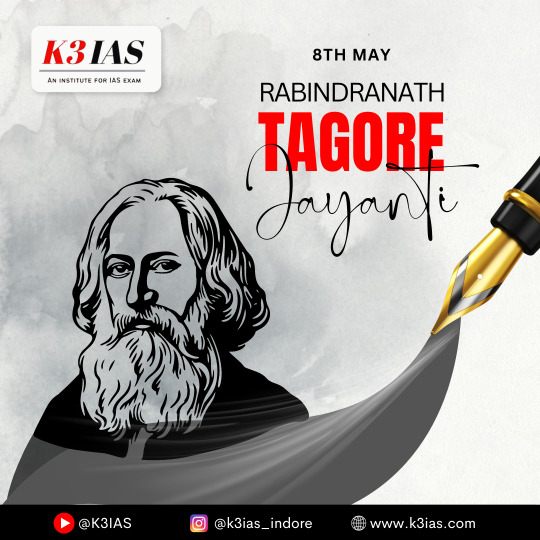
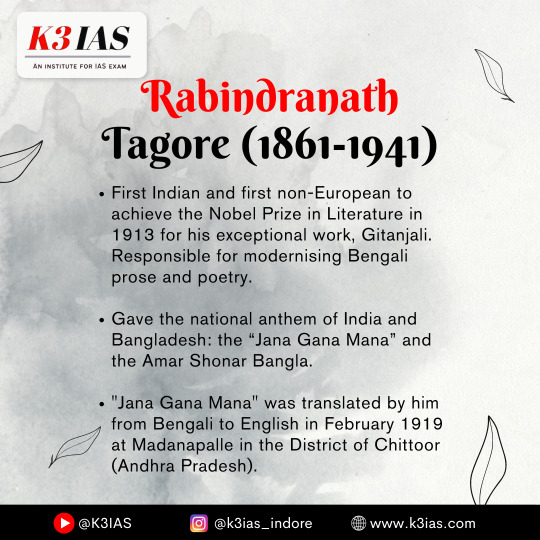

वर्तमान चाहे कितना ही अंधकारमय क्यों न हो, कोशिश करेंगे तो कुछ शानदार सामने आएगा.✨
रवींद्रनाथ टैगोर
.
रवींद्रनाथ टैगोर की जयंती के अवसर पर उन्हें शत्-शत् नमन!🙏🏼✨
.
.
👉Follow: @k3ias_indore
Visit: www.k3ias.com
#nationalanthem#India#nationalism#humanism#rabindranathtagore#literature#poet#bengal#patriot#birthday#rabindranathtagorejayanti#nation#nationhood#emotion#rabindrajayanti#rabindrajatanti#poemoftagore#upscmains#upsc#mppsc2024#civilservices#currentaffairs#quiz#fact#currentnews#quizchallenge#mcq#currentaffairs2024#mppsctestseries
1 note
·
View note
Text
Best UPSC Coaching In Surat | UPSC Academy in Surat - CompetitionPedia
Looking for Best UPSC Coaching in Surat? Get all your answers at CompetitionPedia - your best upsc academy in surat to bring success in IAS career.
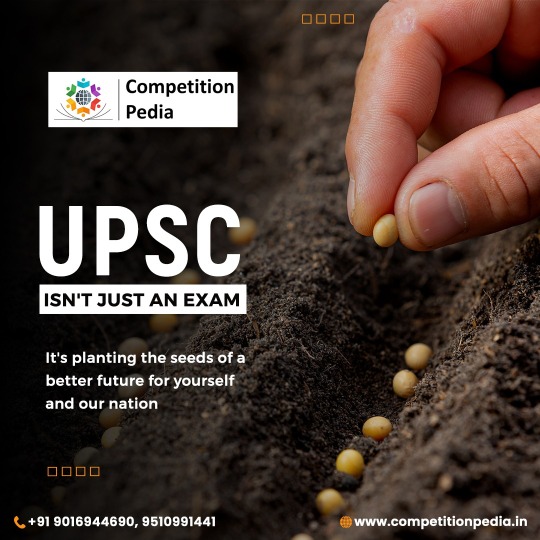
#upsc#upscexam#upscprelims#upscmains#iasexam#upsccoaching#upscexampreparation#civilservices#upsccoachinginsurat#upsceligibilty#upscnotification#upscsyllabus#upsctestseries#upscquiz#exampreparation
0 notes
Text

UPSC Prelims Toolkit 2024-25 | Guide2success
India’s Leading IAS Academy Guide2Success Brings To You..
The Ultimate UPSC Prelims(GS + CSAT) Toolkit for 2024/25 that helped thousand of Aspirants to Seal Their Spot in The List of Prelims Qualified Students And Score 60% Higher Than The Rest
0 notes
Text


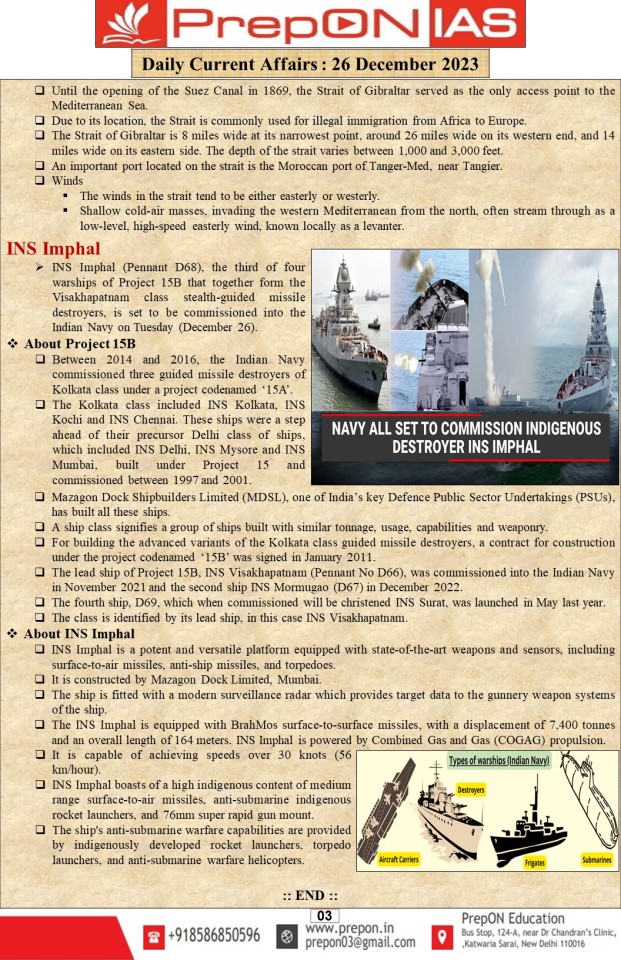
Daily Current Affairs : 26 December 2023
#UPSC#upscaspirants#UPSCPrelims2024#upscprelims#upscmains#dailynews#currentaffairs#infographics#IndianNews#generalknowledge#Indian#India#iasaspirants#iasexam#VeerBaalDiwas2023#VeerBalDiwas#VeerBaalDivas
0 notes
Text
Mastering Geography: UPSC Mains Previous Year Questions Analysis (2013-2022)

Mastering Geography: UPSC Mains Previous Year Questions Analysis (2013-2022) Unlock the key to success in the UPSC Mains Geography exam with our comprehensive analysis of the previous year's questions from 2013 to 2022. In this video, we delve deep into the exam trends, important themes, and crucial topics that you need to focus on for your preparation. We've also identified probable questions that can give you a competitive edge. Whether you're a seasoned UPSC aspirant or just starting your journey, this video is your ultimate guide to mastering Geography. Don't miss out on this valuable resource to streamline your preparation and boost your chances of success. Subscribe now and embark on your path to UPSC success!
0 notes
Text

EDEN IAS, which claimed to be the first to propose this idea of a 3-year foundation course, has been recognized as the best IAS coaching center in Delhi with sufficient research and supporting facts as well as figures based on it. The name of the program is LAKSHYA a 3- year foundation course regarded to be the most extensive and highest-quality deliverable program.
#foundation#upsc#iasexam#IAS#civilservices#upsc2025#foundationdationcourse#upscaspirants#india#indiaclicks#governament#edenias#career#delhi#iascoaching#skills#upscmains#foundationcoaching
0 notes
Text
Mastering UPSC Preparation: Strategies, Resources, and Tips for Success
The Union Public Service Commission (UPSC) Civil Services Examination is a significant and demanding test, often considered one of the toughest competitive exams in India. Preparing for this examination requires not just hard work but also smart strategies, meticulous planning, and a thorough understanding of the content. This article aims to provide a detailed guide to mastering UPSC preparation, highlighting effective strategies, essential resources, and practical tips for success.
1. Decoding the UPSC Exam Pattern
The UPSC Civil Services Examination is conducted in three stages:
Preliminary Examination: Comprises two objective-type papers – General Studies (GS) Paper I and Civil Services Aptitude Test (CSAT) Paper II.
Mains Examination: Consists of nine descriptive papers, including compulsory papers and optional subjects.
Interview: A personality test that assesses the candidate's suitability for a career in civil services.
Understanding the exam pattern and the structure of each stage is crucial for effective preparation.
2. Detailed Syllabus Breakdown
The UPSC syllabus is extensive but can be navigated with a structured approach:
Preliminary Exam Syllabus:
General Studies Paper I: Topics include Indian History, Geography, Current Events, Indian Polity, Economic and Social Development, Environmental Ecology, and General Science.
CSAT Paper II: Focuses on Comprehension, Logical Reasoning, Interpersonal Skills, Decision Making, Basic Numeracy, and English Language Proficiency.
Mains Exam Syllabus:
Essay Paper: Requires writing two essays on diverse topics.
General Studies Papers I-IV:
GS I: Covers Indian Heritage, Culture, History, and Geography.
GS II: Deals with Governance, Constitution, Polity, Social Justice, and International Relations.
GS III: Includes Technology, Economic Development, Bio-diversity, Environment, Security, and Disaster Management.
GS IV: Focuses on Ethics, Integrity, and Aptitude.
Optional Subject Papers: Candidates choose one subject from a list of options, typically related to their academic background or interests.
3. Essential Resources for Preparation
Choosing the right resources is fundamental for effective study. Here’s a guide to recommended materials:
Books:
General Studies: "Indian Polity" by M. Laxmikanth, "Indian Economy" by Ramesh Singh, "Certificate Physical and Human Geography" by G.C. Leong, and "Ethics, Integrity, and Aptitude" by Subba Rao.
Current Affairs: Regularly read "The Hindu" or "The Indian Express" and use magazines like "Yojana" and "Kurukshetra".
Optional Subjects: Refer to standard textbooks and academic journals specific to the chosen subject.
Online Resources:
Utilize UPSC-focused websites and mobile apps for updated current affairs, study materials, and practice tests.
Join online forums and discussion groups to exchange knowledge and gain insights from fellow aspirants.
Previous Years’ Papers and Mock Tests:
Solve previous years' question papers to understand the pattern and types of questions asked.
Regularly take mock tests to assess your preparation level, improve time management, and identify areas needing improvement.
4. Crafting an Effective Study Plan
A well-structured study plan is the cornerstone of successful preparation:
Initial Stage:
Syllabus Familiarization: Thoroughly review the syllabus for each paper and create a detailed study plan.
Resource Gathering: Collect necessary books, current affairs materials, and study aids.
Regular Study:
Daily Routine: Allocate dedicated time each day for studying different subjects. Include time for reading, note-making, and revising.
Weekly Goals: Set achievable goals for completing specific topics and practicing questions.
Prelims Focus:
Prioritize understanding key concepts and solving MCQs. Emphasize current affairs and general knowledge.
Mains Focus:
Develop a deep understanding of concepts and practice answer writing. Focus on integrating different topics into cohesive answers.
Interview Preparation:
Enhance your communication skills, stay updated on current affairs, and engage in mock interviews to prepare for the personality test.
5. Managing Stress and Maintaining Well-being
UPSC preparation can be stressful, so it’s essential to manage stress and maintain a healthy lifestyle:
Balanced Routine: Incorporate regular breaks into your study schedule. Avoid long, uninterrupted study sessions.
Physical Health: Engage in regular physical activity and maintain a healthy diet.
Mental Health: Practice relaxation techniques such as meditation, and ensure you have hobbies or activities that help you unwind.
6. Final Tips for Success
Consistency: Stick to your study plan and make consistent efforts. Regularity is key to covering the vast syllabus.
Adaptability: Be flexible and ready to adjust your strategy based on your progress and evolving needs.
Self-Evaluation: Regularly assess your performance through mock tests and practice papers. Identify weaknesses and work on them.
Conclusion
Mastering UPSC preparation involves a blend of strategic planning, disciplined study, and holistic self-care. By understanding the exam pattern, utilizing the right resources, and following a structured approach, candidates can effectively navigate the challenges of the UPSC Civil Services Examination. Remember, perseverance, and a positive mindset are critical to achieving success in this demanding yet rewarding journey.
0 notes
Text
youtube
#upsc#upsc current affairs#upsc2024#upsccoaching#upscmotivation#upscmains#upscexam#upsc2023#upscaspirant#upscprelims#Youtube
0 notes
Text

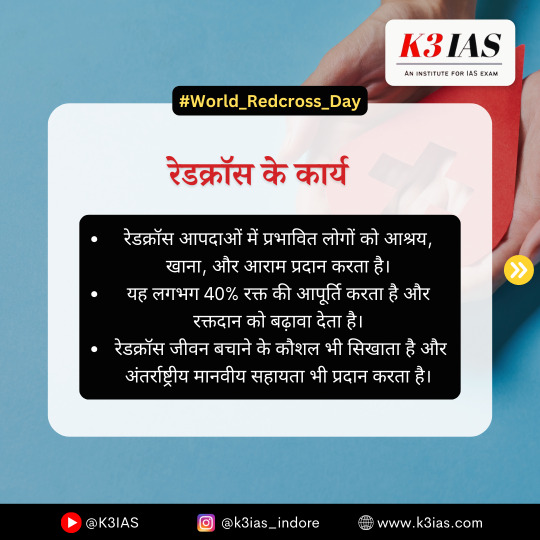
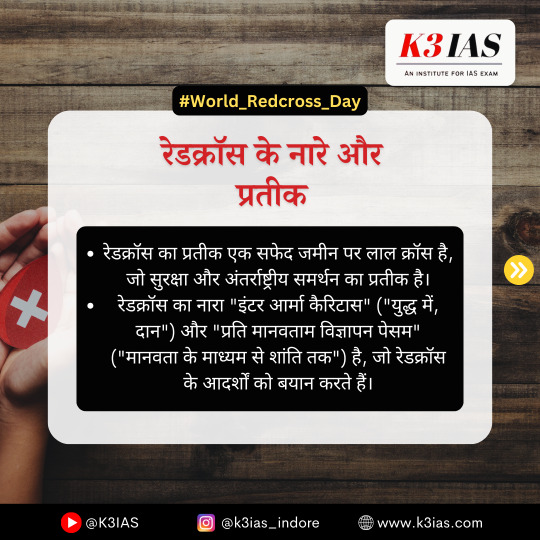
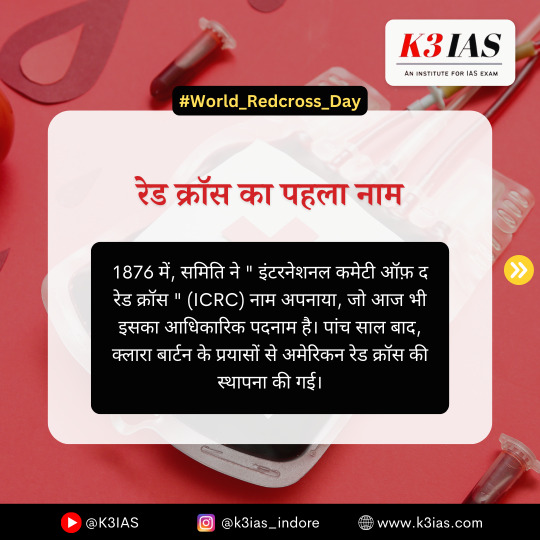
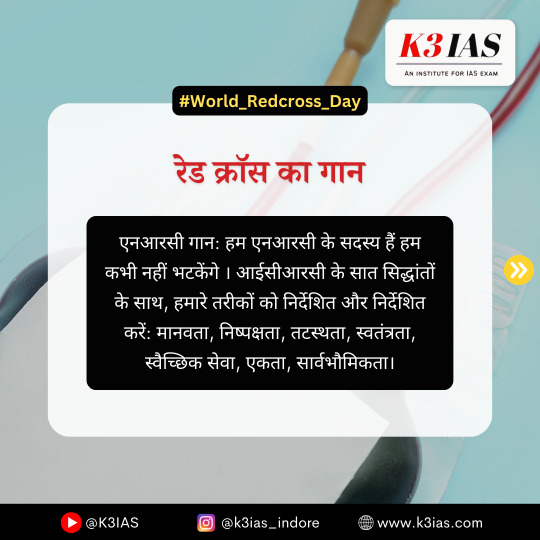

"I give with joy, and the joy I give is a reward"✨
.
On World Red Cross Day, let's celebrate the boundless spirit of empathy and humanitarianism that unites us all.✨
.
.
👉Follow: @k3ias_indore
Visit: www.k3ias.com
#REDCROSS#WORLDREDCROSSDAY#8MAY#upscmains#upsc#mppsc2024#mppscpre#mppscmains#mppscprelims#mppscinterview#mpcurrent#mppsc#mppsccurrentaffairs#civilservices#currentaffairs#quiz#fact#currentnews#quizchallenge#mcq#currentaffairs2024#mppsctestseries
0 notes
Text
Top IAS Coaching in Vadodara & Surat | Best IAS Coaching | CompetitionPedia
CompetitionPedia Vadodara is one of the Best IAS Coaching in Vadodara providing Top IAS Coaching in Vadodara & Surat with low fees structure and lots of free resources- test series, quizzez, mock test etc.
#upscprelims#upscmains#iasexam#upsccoaching#upscexampreparation#civilservices#upsccoachinginsurat#upsceligibilty#upscnotification#upscsyllabus#upsctestseries#upscquiz#exampreparation#ias#iascoaching#iaspreparation#upsc2024
0 notes
